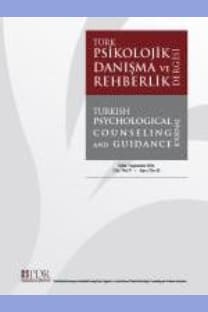Üniversiteye Uyum Sürecinde Yalnızlığı Yordamada Sosyal Destek ve Sosyal Bağlılığın Doğrudan ve Dolaylı Rolleri
Bu çalısmanın amacı, sosyal baglılık ve sosyal destegin yalnızlık üzerine dogrudan ve dolaylı rollerinin üniversiteye uyum süreci çerçevesinde incelenmesidir. Arastırmanın çalısma grubunu Pamukkale Üniversitesi Egitim Fakültesinin farklı bölümlerinde ögrenim gören 112’si kız, 86’sı erkek olmak üzere 198 ögrenci olusturmaktadır. Ögrencilerin yasları 17-23 arasında degismektedir. Veri toplamak için bilgi formu, Sosyal Baglılık
Ölçegi, Yalnızlık Ölçegi, Algılanan Çok Boyutlu Sosyal Destek Ölçegi ve Uyum Zorlukları Ölçekleri kullanılmıstır. Veriler korelasyon, Sobel testi, tekli ve çoklu regresyon teknikleri kullanılarak analiz edilmistir. Arastırma sonuçlarına göre; sosyal destek ve sosyal baglılık yalnızlıkla negatif, uyum zorlukları yalnızlıkla pozitif yönde anlamlı iliskiler vermektedir. Ek olarak, bulgular sosyal destek, sosyal baglılık ve uyum zorluklarının yalnızlıgın önemli yordayıcıları olduklarını göstermektedir. Analiz sonuçlarına göre, sosyal destek ve sosyal baglılık uyum zorlukları-yalnızlık iliskisinde dolaylı rollere de sahiptirler. Bir diger anlatımla, sosyal destek ve sosyal baglılık hem yalnızlıgı dogrudan yordayabilmekte, hem de uyum zorlukları yalnızlık
iliskisinde etkili iki ara degisken islevi üstlenmektedirler.
Anahtar Kelimeler:
-
THE DIRECT AND INDIRECT ROLES OF SOCIAL CONNECTEDNESS AND SOCIAL SUPPORT IN PREDICTING LONELINESS IN THE ADJUSTMENT PROCESS TO UNIVERSITY
The purpose of this study was to examine the direct and indirect roles of social connectedness and social support on loneliness in the adjustment process to university. The sample of this study was composed of 198 university students (112 female and 86 male) studying at different departments of the Faculty of
Education at Pamukkale University. The age of the students ranged from 17 to 23. Social Connectedness Scale, UCLA Loneliness Scale, Multiple Scale of Perceived Social Support, and
Adjustment Difficulties Scale were used to collect data. All data were analyzed by correlation, Sobel test statistic, and single and multiple regressions. The results showed that social support, social sonnectedness and adjustment difficulties correlated
significantly in the expected direction with measures of loneliness. In addition, findings indicated that social support, social connectedness and adjustment difficulties were predictors of loneliness. Social connectedness and social support have also indirect roles. In other words, social connectedness and social
support serve not only indirectly as a mediator to adjustment difficulties in predicting to loneliness, but also they predict directly to loneliness.
Keywords:
-,
- ISSN: 1302-1370
- Başlangıç: 1990
- Yayıncı: -
Sayıdaki Diğer Makaleler
Eleştirel Düşünme Eğitiminin PDR Öğrencilerinin Eleştirel Düşünme Becerilerine Etkisi
Jale ELDELEKLİOĞLU, Rüçhan ÖZKILIÇ
Lise Öğrencileri İçin Meslek Seçimine İlişkin Akılcı Olmayan İnançlar Ölçeği’nin Geliştirilmesi
Ayşe YILMAZ ERDEM, Filiz BİLGE
Lise Öğrencileri İçin Meslek Seçimine İlişkin Akılcı Olmayan İnançlar Ölçeği'nin Geliştirilmesi
Ayşe ERDEM YILMAZ, Filiz BİLGE
Duygusal Farkındalık Düzeyi Ölçeğinin Uyarlanması: Geçerlik ve Güvenirlik Çalışmaları
Çok Kültürlülük, Kültürel Duyarlılık ve Psikolojik Danışma
Evlilikte Yetkinlik Ölçeğinin Geliştirilmesi:Geçerlik ve Güvenirlik Çalışması
Hüdayar CİHAN GÜNGÖR, Yaşar ÖZBAY
İkili İlişkiler Güven Ölçeği’nin Geçerlik ve Güvenirlik Çalısmaları
